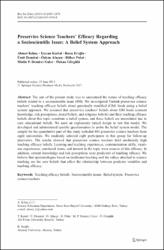| dc.contributor.author | Kilinc, Ahmet | |
| dc.contributor.author | Kartal, Tezcan | |
| dc.contributor.author | Eroglu, Baris | |
| dc.contributor.author | Demiral, Umit | |
| dc.contributor.author | Afacan, Ozlem | |
| dc.contributor.author | Polat, Dilber | |
| dc.contributor.author | Guler, Mutlu P. Demirci | |
| dc.date.accessioned | 2019-11-24T20:35:37Z | |
| dc.date.available | 2019-11-24T20:35:37Z | |
| dc.date.issued | 2013 | |
| dc.identifier.issn | 0157-244X | |
| dc.identifier.issn | 1573-1898 | |
| dc.identifier.uri | https://dx.doi.org/10.1007/s11165-013-9368-8 | |
| dc.identifier.uri | https://hdl.handle.net/20.500.12513/1920 | |
| dc.description | WOS: 000327852300014 | en_US |
| dc.description.abstract | The aim of the present study was to understand the nature of teaching efficacy beliefs related to a socioscientific issue (SSI). We investigated Turkish preservice science teachers' teaching efficacy beliefs about genetically modified (GM) foods using a belief system approach. We assumed that preservice teachers' beliefs about GM foods (content knowledge, risk perceptions, moral beliefs, and religious beliefs) and their teaching efficacy beliefs about this topic constitute a belief system, and these beliefs are interrelated due to core educational beliefs. We used an exploratory mixed design to test this model. We developed and administered specific questionnaires to probe the belief system model. The sample for the quantitative part of this study included 441 preservice science teachers from eight universities. We randomly selected eight participants in this group for follow-up interviews. The results showed that preservice science teachers held moderately high teaching efficacy beliefs. Learning and teaching experiences, communication skills, vicarious experiences, emotional states, and interest in the topic were sources of this efficacy. In addition, content knowledge and risk perceptions were predictors of teaching efficacy. We believe that epistemologies based on traditional teaching and the values attached to science teaching are the core beliefs that affect the relationship between predictor variables and teaching efficacy. | en_US |
| dc.language.iso | eng | en_US |
| dc.publisher | SPRINGER | en_US |
| dc.relation.isversionof | 10.1007/s11165-013-9368-8 | en_US |
| dc.rights | info:eu-repo/semantics/closedAccess | en_US |
| dc.subject | Teaching efficacy beliefs | en_US |
| dc.subject | Socioscientific issues | en_US |
| dc.subject | Belief system | en_US |
| dc.subject | Preservice science teachers | en_US |
| dc.title | Preservice Science Teachers' Efficacy Regarding a Socioscientific Issue: A Belief System Approach | en_US |
| dc.type | article | en_US |
| dc.relation.journal | RESEARCH IN SCIENCE EDUCATION | en_US |
| dc.contributor.department | Kırşehir Ahi Evran Üniversitesi, Eğitim Fakültesi, Matematik ve Fen Bilimleri Eğitimi Bölümü | en_US |
| dc.identifier.volume | 43 | en_US |
| dc.identifier.issue | 6 | en_US |
| dc.identifier.startpage | 2455 | en_US |
| dc.identifier.endpage | 2475 | en_US |
| dc.relation.publicationcategory | Makale - Uluslararası Hakemli Dergi - Kurum Öğretim Elemanı | en_US |


















